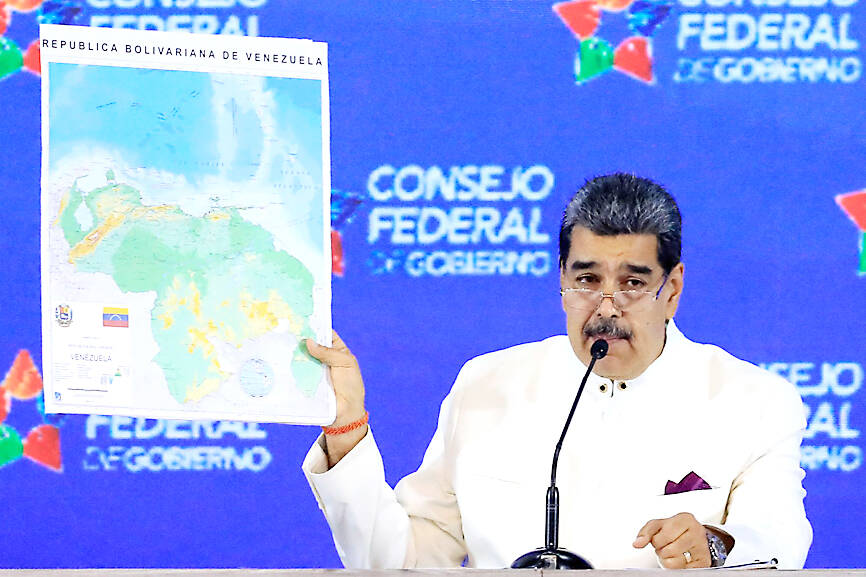Tensions on Tuesday rose between Venezuela and Guyana as Caracas proposed a bill to create a Venezuelan province in a disputed oil-rich region and ordered the state oil company to issue licenses for extracting crude there.
Venezuelan President Nicolas Maduro proposed at a government meeting that a bill be sent to the National Assembly for the creation of a “Guyana Esequiba” province in a region Guyana has administered for more than a century.
He also said oil, gas and mining licenses must be issued immediately.

Photo: AFP / VENEZUELAN PRESIDENCY / ZURIMAR CAMPOS
Guyanese President Irfaan Ali called Maduro’s statements a “direct threat” against his country, and rejected the measures announced by the Venezuelan leader.
On Sunday, Venezuela held a controversial nonbinding referendum on the region’s fate that yielded an overwhelming 95 percent “yes” vote for Caracas’ designs on Essequibo, or Esequiba as it is known in Venezuela.
Maduro gave an ultimatum to oil companies working under concessions given by Guyana to withdraw their operations within three months.
He also said a town bordering the disputed area, Tumeremo, would become headquarters of Venezuelan efforts to defend its interests there, adding that authorities would conduct a census and begin issuing identity cards without giving details of how that would occur.
Earlier on Tuesday, Guyana said it would approach the UN Security Council for help if Venezuela makes any moves following the referendum, which Guyana had sought to stop with an urgent application to the International Court of Justice (ICJ) in The Hague.
Guyanese Attorney General Anil Nandlall said that “any action or any attempt to take any action pursuant to the referendum will necessitate a resort to the UN Security Council as an injured party.”
He said Guyana would invoke Articles 41 and 42 of the UN Charter which can authorize sanctions or military action to maintain or restore international peace and security.
“In terms of military, it [the UN Security Council] can authorize the use of armed forces by member states to assist in the enforcement” of ICJ orders, Nandlall said.
The Essequibo region makes up more than two-thirds of Guyana’s territory and is home to 125,000 of its 800,000 citizens.
Litigation is pending before the ICJ over where the borders should lie.

China yesterday held a low-key memorial ceremony for the 1937 Nanjing Massacre, with Chinese President Xi Jinping (習近平) not attending, despite a diplomatic crisis between Beijing and Tokyo over Taiwan. Beijing has raged at Tokyo since Japanese Prime Minister Sanae Takaichi last month said that a hypothetical Chinese attack on Taiwan could trigger a military response from Japan. China and Japan have long sparred over their painful history. China consistently reminds its people of the 1937 Nanjing Massacre, in which it says Japanese troops killed 300,000 people in what was then its capital. A post-World War II Allied tribunal put the death toll

The Burmese junta has said that detained former leader Aung San Suu Kyi is “in good health,” a day after her son said he has received little information about the 80-year-old’s condition and fears she could die without him knowing. In an interview in Tokyo earlier this week, Kim Aris said he had not heard from his mother in years and believes she is being held incommunicado in the capital, Naypyidaw. Aung San Suu Kyi, a Nobel Peace Prize laureate, was detained after a 2021 military coup that ousted her elected civilian government and sparked a civil war. She is serving a

‘NO AMNESTY’: Tens of thousands of people joined the rally against a bill that would slash the former president’s prison term; President Lula has said he would veto the bill Tens of thousands of Brazilians on Sunday demonstrated against a bill that advanced in Congress this week that would reduce the time former president Jair Bolsonaro spends behind bars following his sentence of more than 27 years for attempting a coup. Protests took place in the capital, Brasilia, and in other major cities across the nation, including Sao Paulo, Florianopolis, Salvador and Recife. On Copacabana’s boardwalk in Rio de Janeiro, crowds composed of left-wing voters chanted “No amnesty” and “Out with Hugo Motta,” a reference to the speaker of the lower house, which approved the bill on Wednesday last week. It is

FALLEN: The nine soldiers who were killed while carrying out combat and engineering tasks in Russia were given the title of Hero of the Democratic People’s Republic of Korea North Korean leader Kim Jong-un attended a welcoming ceremony for an army engineering unit that had returned home after carrying out duties in Russia, North Korean state media KCNA reported on Saturday. In a speech carried by KCNA, Kim praised officers and soldiers of the 528th Regiment of Engineers of the Korean People’s Army (KPA) for “heroic” conduct and “mass heroism” in fulfilling orders issued by the ruling Workers’ Party of Korea during a 120-day overseas deployment. Video footage released by North Korea showed uniformed soldiers disembarking from an aircraft, Kim hugging a soldier seated in a wheelchair, and soldiers and officials